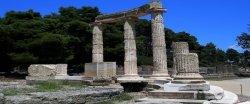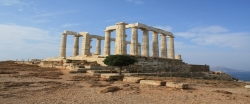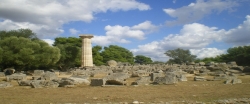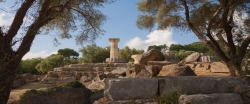Le nostre destinazioni più richieste
I nostri tour:
Common description
The cradle of the Olympic Games
Lively and suggestive town among hills with thick vegetation, it is scattered with the remains of temples and the ruins of one of the most important sanctuaries dedicated to Zeus. In his honor, the Olympic Games were celebrated every four years, hence the name of the competition. Not to be missed is the Archaeological Site of the city.
Olympia is the name of the ancient Greek city, site of the "Olympic" games but also a place of worship of great importance, as evidenced by the remains of ancient temples, theatres, monuments and statues, which came to light after excavations carried out in the area where the city originally stood. For over a millennium, athletes and pilgrims from all over Greece have gathered here every four years, and it is here that the Olympic flame is lit today, announcing the start of the competitions.
Today Olympia is a fascinating archaeological park, with a melancholic and luxurious beauty at the same time. A must for tourists visiting the Peloponnese, who can admire the ruins of its majestic temples with altars, columns and exhibits, including the magnificent and famous Hermes. Attributed to Prassetile, the marble was found in the ruins of the temple of Hera, or Heranion. The elegant porticoes of the gymnasium, the splendid metopes of the temple of Zeus, illustrating the labors of Heracles (or Hercules for the Romans), the Nike of Paionios and the bronze boxer are all admirable works that still shine with the golden aura of civilization Greek.
Where it is and how to reach Olympia.
Where it is: Olympia (Olympia in Greek) is located in the Peloponnese region.
By plane:
Flight to Athens and then about 400km. Flight to Zakynthos or Kefalonia, then an hour by ferry to reach Killini and from there by car about 50km.
On boat:
From Ancona, Bari or Venice to Patras and then by car towards Pyrgos / Olympia to the south (about 100km).
More information, useful advice and curiosities in the travel documents that will be sent before departure.
Lively and suggestive town among hills with thick vegetation, it is scattered with the remains of temples and the ruins of one of the most important sanctuaries dedicated to Zeus. In his honor, the Olympic Games were celebrated every four years, hence the name of the competition. Not to be missed is the Archaeological Site of the city.
Olympia is the name of the ancient Greek city, site of the "Olympic" games but also a place of worship of great importance, as evidenced by the remains of ancient temples, theatres, monuments and statues, which came to light after excavations carried out in the area where the city originally stood. For over a millennium, athletes and pilgrims from all over Greece have gathered here every four years, and it is here that the Olympic flame is lit today, announcing the start of the competitions.
Today Olympia is a fascinating archaeological park, with a melancholic and luxurious beauty at the same time. A must for tourists visiting the Peloponnese, who can admire the ruins of its majestic temples with altars, columns and exhibits, including the magnificent and famous Hermes. Attributed to Prassetile, the marble was found in the ruins of the temple of Hera, or Heranion. The elegant porticoes of the gymnasium, the splendid metopes of the temple of Zeus, illustrating the labors of Heracles (or Hercules for the Romans), the Nike of Paionios and the bronze boxer are all admirable works that still shine with the golden aura of civilization Greek.
Where it is and how to reach Olympia.
Where it is: Olympia (Olympia in Greek) is located in the Peloponnese region.
By plane:
Flight to Athens and then about 400km. Flight to Zakynthos or Kefalonia, then an hour by ferry to reach Killini and from there by car about 50km.
On boat:
From Ancona, Bari or Venice to Patras and then by car towards Pyrgos / Olympia to the south (about 100km).
More information, useful advice and curiosities in the travel documents that will be sent before departure.





